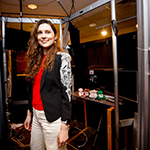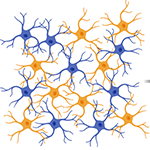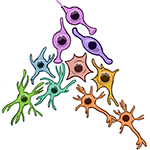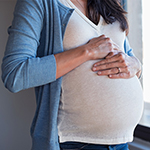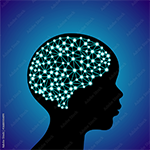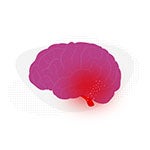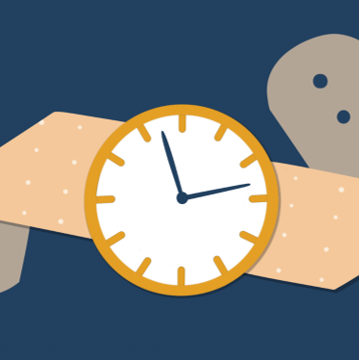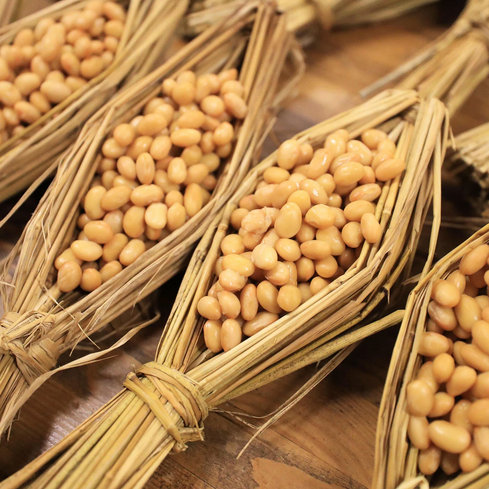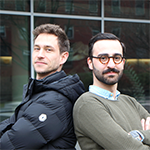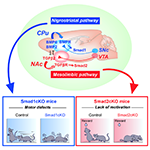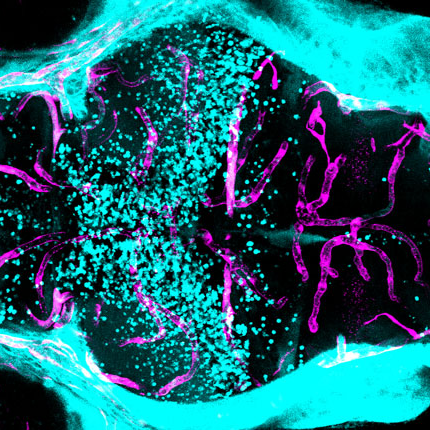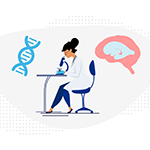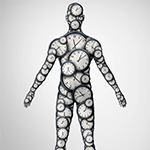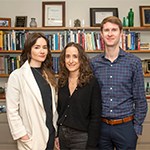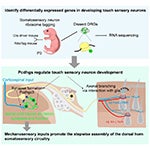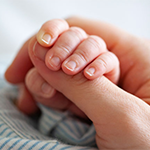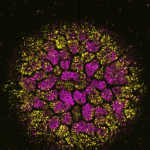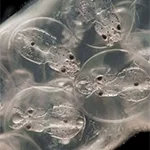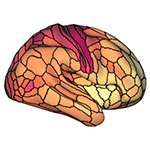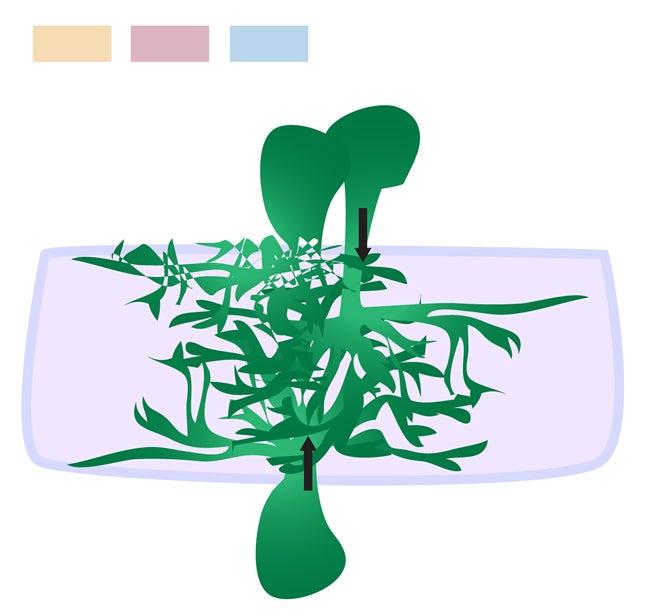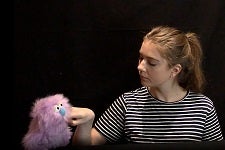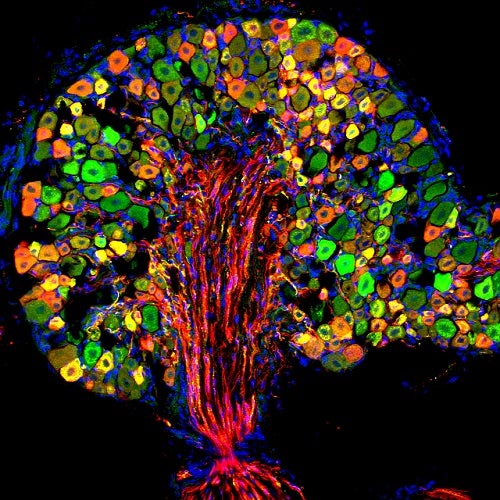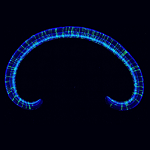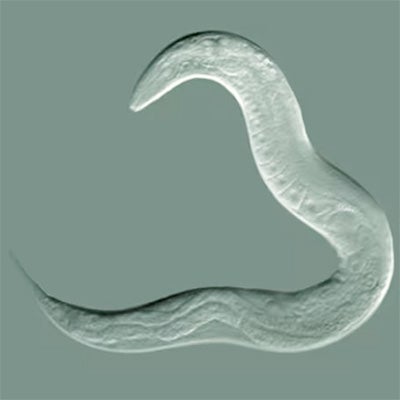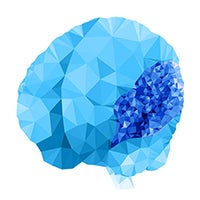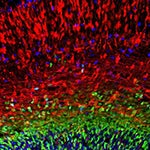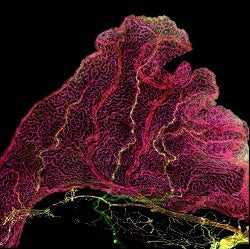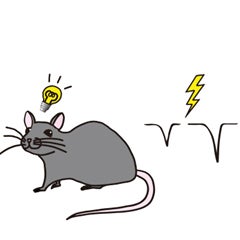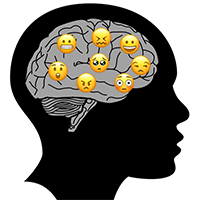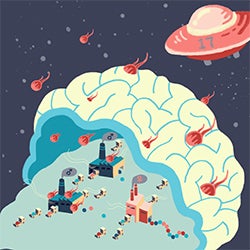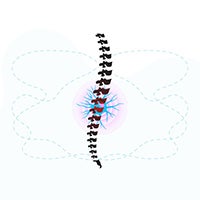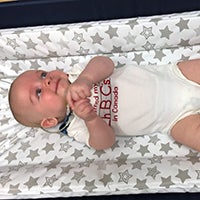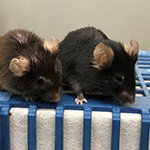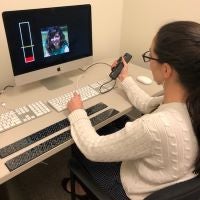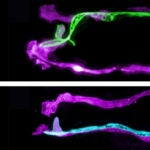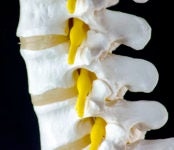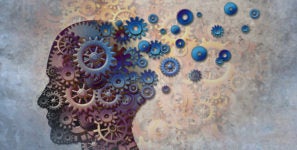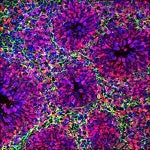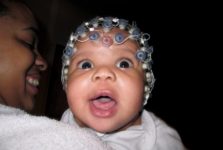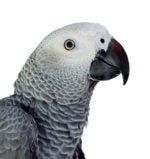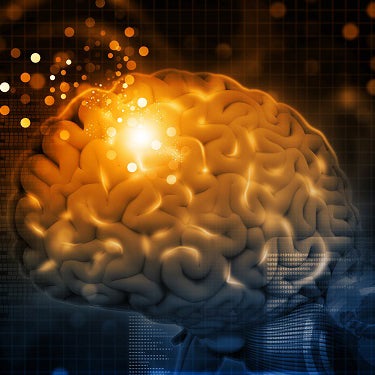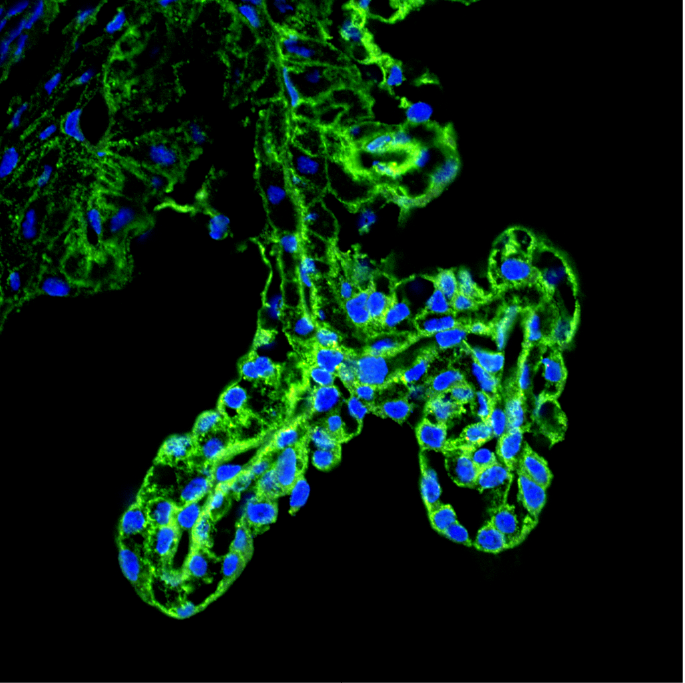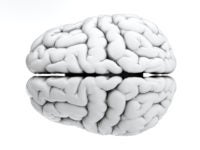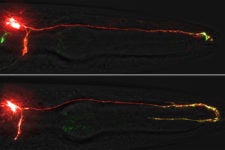Neuro Topics - Developmental Neuroscience
SEARCH OTHER RESEARCH AREAS
June 18, 2025
Harvard Gazette interview with Elena Luchkina, Research Scientist in the Spelke lab in the Harvard Dept. of Psychology, discussing her recent paper which found that infants develop the ability to guess the meanings of nouns without first seeing them by 12 to 15 months.
Original article in: PLOS One >
June 16, 2025
It was long thought that only neurons in the outermost regions of the brain, called the cortex, could adapt and change their properties in response to visual experience. Takuma Sonoda and Chinfei Chen share new findings revealing that the visual thalamus, a structure in the center of the brain, at an earlier stage in the visual pathway than the cortex, can also change based on what animals see. Their discovery expands our understanding of how sensory systems learn and adapt.
Original article in: Cell >
January 2, 2025
How do pediatric brain tumors mimic normal brain development, and how can this be leveraged for therapies? Ilon Liu, Mariella Filbin and colleagues find that a specific brain tumor type resembles GABAergic interneuron development, and with this knowledge they identify novel targets against this lethal tumor.
Original article in: Cancer Cell >
November 22, 2024
New research from Christopher Walsh and colleagues, co-first authors Eduardo A Maury, Attila Jones, and Vladimir Seplyarskiy, suggests that distinctive patterns of non-inherited (somatic) mutations are important contributors to schizophrenia. These mutations appear to have occurred as the brain was forming and affect just a portion of its neurons.
Original article in: Science >
August 27, 2024
A lot is unknown about how brain circuits develop and mature in babies and toddlers. Carol Wilkinson shares new data on developmental trajectories of EEG activity from 0-3 years—revealing age-dependent, nonlinear changes in periodic alpha and beta brain waves that are suggestive of distinct milestones in circuit maturation.
Original article in: Nature Communications >
April 22, 2024
Some infants who pass away from sudden infant death syndrome (SIDS) are known to have had acute minor infections. Could these have played a role in their death? Using next-generation molecular tools, a new study provides evidence that undiagnosed inflammation and occult infection can contribute to SIDS and the brainstem pathology seen in some infants.
Original article in: JAMA Neurology >
March 14, 2024
New research from Peter Aungle and Ellen Langer finds that an individual’s perception of how much time has elapsed substantially impacts the speed at which minor bruising fades. This is the first study to demonstrate this psychological effect on the physical healing process.
Original article in: Nature Scientific Reports >
March 14, 2024
New research Erin Hecht and colleagues, first author Katherine L. Bryant (Aix-Marseille Université) puts fermentation, not fire, as pivot point behind our ancestors’ increasing cranial capacity.
Original article in: Nature >
February 8, 2024
The Engert lab found that in zebrafish, previous visual experience had no effect on the emergence of their optomotor response (OMR). Fish raised in the dark (no visual experience) and fish raised under a strobe light (irregular visual experience) both developed this visually-guided behavior normally.
Original article in: Nature Communications >
February 2, 2024
An international team of researchers have found that the main predictors of language development globally are age, clinical factors such as prematurity or dyslexia, and how much speech children receive from the world around them. No effects were found related to gender, multilingualism, or socioeconomics, contrasting with previous research.
Original article in: PNAS >
October 6, 2023
Akiko Terauchi and Hisashi Umemori share new research that identified the pathway-specific signals that establish functionally segregated dopaminergic synaptic connections in the mammalian brain. The findings may provide strategies to treat pathway-specific disease symptoms in diseases like Parkinson's disease, schizophrenia, and depression, by targeting the pathway-specific molecular signals.
Original article in: Cell >
September 27, 2023
Harvard Gazette article on new research from Tianyi Huang and colleagues, first author Sina Kianersi, finding that people with later sleep and wake times had less-healthy lifestyles and were at greater risk of developing diabetes than those with early bird habits.
Original article in: Annals of Internal Medicine >
July 21, 2023
HMS News article on new research from Sean Megason, Chenghua Gu, Allon M. Klein, and colleagues, first author Natasha O'Brown, using mice and zebrafish to discover a signal produced by neurons that helps the blood-brain barrier form and maintain its protective properties.
Original article in: Developmental Cell >
June 16, 2023
Harvard Gazette Q+A with JoAnn Manson, who along with Howard Sesso, co-led a collaboration between BWH and HSPH called the the COSMOS-Web Study. This study showed that among 3,500 subjects 60 and older, a daily multivitamin led to 3.1 years less cognitive aging than for those assigned a placebo. This clinical study was the second cognition trial in COSMOS to suggest that multivitamins can slow memory loss.
Original article in: American Journal of Clinical Nutrition >
May 25, 2023
Boston Children's Hospital Answers article on new research from from the teams of Maria Lehtinen, Mark Andermann, Hanno Steen, and clinician colleagues at Boston Children’s Hospital and Mass General Hospital, co-first authors Cameron Sadegh and Huixin Xu, suggesting that gene therapy targeting the brain’s choroid plexus could help prevent or ameliorate hydrocephalus in premature newborns with brain bleeds.
Original article in: Neuron >
May 11, 2023
Harvard Gazette article on new research from Vadim N. Gladyshev and colleagues, first author Jesse R. Poganik, finding that in preclinical models and in humans, stress from surgery, pregnancy, and severe COVID-19 increased signs of biological age, which were reversed following recovery.
Original article in: Cell Metabolism >
May 11, 2023
Harvard Gazette article on new research from Katie A. McLaughlin and colleagues, first author David G Weissman (a recipient of the HBI Young Scientist Transitions Award). They found that robust aid programs may buffer young minds from the effects of anxiety and depression. Benefits like cash assistance and access to Medicaid were found to be especially beneficial.
Original article in: Nature Communications >
May 5, 2023
Shan Meltzer and Emmanuella Asante share new research from the Ginty lab showing that the clustered protocadherin gamma (Pcdhg) gene locus regulates somatosensory neuron synapse formation, mechanosensory neuron branching patterns, and circuit assembly in the mechanosensory dorsal horn.
Original article in: Cell >
March 31, 2023
HMS News article on new research from Roy H. Perlis and colleagues, first author Andrea G. Edlow, finding that male but not female babies born to women who tested positive for SARS‐CoV‐2 during pregnancy were more likely to be diagnosed with a neurodevelopmental disorder in their first 12 months.
Original article in: JAMA Network Open >
February 24, 2023
Harvard Gazette article on new research from Susan Carey and colleagues, first author Brian Leahy, on the developmental psychology of 3-year-olds. They found that they struggle to keep track of competing options and instead they "find one state that is merely possible and treat it as fact."
Original article in: PNAS >
February 24, 2023
Harvard MCB Department news article on new research from Sharad Ramanathan and colleagues, first author Giri Anand. They cultivated stem cells to mirror the process of axial elongation in the developing embryo allowing them to see how the neural tube develops into the spinal cord.
Original article in: Cell >
February 24, 2023
HMS News article on new research from Nathaniel Harnett and Kerry Ressler, first author Nathalie M. Dumornay, highlighting how structural racism may affect brain development and psychiatric disease in Black and white children.
Original article in: American Journal of Psychiatry >
January 25, 2023
HMS News article on new research from Olivier Pourquié and colleagues, first author Yuchuan Miao, on the creation of organoids that mimic early spine development in humans. These organoids include a ticking “segmentation clock” like those they previously identified in the embryos of several species and replicated in human stem cells.
Original article in: Nature >
December 8, 2022
Harvard Gazette article on new research from Kristen Koenig and colleagues, co-first authors Francesa R. Napoli and Christina M. Daily, applying a new live-imaging technique to watch the creation of neurons in squid embryos in almost real-time. Tracking these cells through the development of the nervous system in the retina they discovered that these neural stem cells behaved very much like those in vertebrates during nervous-system development.
Original article in: Current Biology >
October 14, 2022
Harvard Gazette article on new research from Judith Owens and colleagues, first author Rebecca Robbins, surveying parents and caregivers and finding that more than two-thirds of those surveyed believed in the top three most salient myths about sleep.
Original article in: Sleep Health >
September 29, 2022
HMS News article interviewing Margaret Livingstone about a recent publication highlighting observations of macaque mothers over 10 years, with surprising new insights into how the mothers form attachments to their newborns.
Original article in: PNAS >
September 20, 2022
Round up of awards and honors earned by the HBI Community
September 9, 2022
Graham Baum and colleagues from the lab of Leah Somerville report on new MRI data analyses investigating the timeline and topography of myelin development in the brain from childhood to early adulthood, using data from the Human Connectome Project in Development. This work is part of a project supported by the HBI Bipolar Disorder Seed Grant program.
Original article in: Journal of Neuroscience >
August 1, 2022
HMS News article profiling the research of Bruce Bean and Clifford Woolf, who are studying how CBD inhibits pain-sensing neurons in order to develop more effective pain medicines.
August 1, 2022
Harvard Gazette article on new research from Samuel Mehr and colleagues, co-first authors Courtney Hilton and Cody J. Moser. They studied 21 cultures, from San Diego to East Africa and found striking similarities in infant-directed speech and song.
Original article in: Nature Human Behavior >
May 24, 2022
HMS News article on new research from Rishi Wadhera, Michael Liu, and colleagues, showing worse mental health outcomes and higher rates of substance abuse among adolescents experiencing homelessness.
Original article in: JAMA >
March 31, 2022
Yiwen Zhu and colleagues from Erin Dunn’s lab examined in humans the effect of genes previously shown to influence the timing of sensitive periods in animals and the interplay between these genetic factors and exposure to commonly occurring childhood adversities on depression risk. They found that genes regulating sensitive periods associated with depression risk and their expression levels varied over the course of development.
Original article in: Neuropsychopharmacology >
March 31, 2022
When neural circuits are assembled, several asymmetric cell behaviors are involved. How are these behaviors coordinated? Evelyn Avilés from the lab of Lisa Goodrich discusses how a new study of the molecule Fat3 and its interactors give us some answers.
Original article in: Cell Reports >
March 8, 2022
Harvard Gazette article on new research from Elizabeth Spelke and colleagues at MIT, first author Ashley Thomas, suggesting infants view kissing or sharing food or utensils as social cues indicating close relationships.
Original article in: Science >
February 24, 2022
Each winner will receive $200. This year we received 27 submissions, of which the below six images were selected as voted on by the Harvard neuroscience community.
February 24, 2022
Harvard Health Publishing article comparing studies on the benefits and drawbacks of using mobile apps that claim to treat depression, anxiety, and other mental illness in lieu of a therapist.
February 24, 2022
Harvard Gazette article on a recent book talk by author Leonard Mlodinow on his new book, Emotional: How Feelings Shape Our Thinking, which argues that thinking and feeling are inextricably linked.
February 24, 2022
How are neuronal subtypes generated during development? Emma West and colleagues from the Cepko Lab propose a hierarchical model for bipolar interneuron genesis in the retina.
Original article in: Cell Reports >
February 7, 2022
Round up of awards and honors earned by the HBI community.
September 21, 2021
Based on a 5-year longitudinal neuroimaging project starting in infancy, Xi Yu and Nadine Gaab share new research demonstrating that functional connectivity in infancy can predict subsequent individual differences in language and foundational literacy abilities at school-age. These results highlight the importance of the early brain function organization as a neural scaffold for long-term development of complex, high-order cognitive functions.
Original article in: Cerebral Cortex >
September 14, 2021
Round up of awards and honors earned by the HBI community.
August 11, 2021
Harvard MCB News article on new research from the labs of Jeff Lichtman, Aravi Samuel, Mei Zhen (U Toronto) and colleagues, first author Daniel Witvliet, reconstructing the full brain of eight isogenic Caenorhabditis elegans to investigate how it changes with age.
Original article in: Nature >
August 11, 2021
Boston Children's Hospital Answers article on new research from Christopher A. Walsh and colleagues, first author Richard Smith, linking mutations in the gene ATP1A3 to polymicrogyria, a disease causing irregular folds and disorganized layering in the cortex, often resulting in severe developmental and intellectual disabilities.
Original article in: PNAS >
July 7, 2021
Harvard Gazette article on new research from the lab of Paola Arlotta and colleagues at the Broad Institute, co-first authors Daniela Di Bella and Ehsan Habibi, combining single-cell genomic technologies to create an atlas for studying cellular diversification in the developing mouse cortex.
Original article in: Nature >
May 17, 2021
Neil Dani & Maria Lehtinen share new research done with Rebecca Herbst, Naomi Habib & Aviv Regev at the Broad Institute. Using single cell & nucleus sequencing, coupled with tissue-level mapping, they have generated the first cellular and spatial atlas of the choroid plexus blood-CSF barrier. This addresses a historical blind spot by characterizing the core cell types, subtypes, their spatial organization and diversity across brain regions of the developing, adult, and aging mouse brain.
Original article in: Cell >
May 6, 2021
Erin Johnson-Venkatesh and Hisashi Umemori share their work trying to understand why X-linked PCDH19-related disorder occurs only in females, and not males – when the opposite is typical for most disorders emanating from mutations on the X-chromosome. They find that inactivation of one copy of Pcdh19 results in a molecular mismatch at hippocampal synapses, leading to functional impairments in female, but not male mice.
Original article in: Science >
April 30, 2021
David G. Weissman shares new research from the labs of Katie McLaughlin and Leah Somerville, investigating if low emotional awareness contributes to the severity of mental health problems in teenagers.
Original article in: Clinical Psychological Science >
April 23, 2021
Harvard Gazette article on new research from Katie A. McLaughlin and colleagues, first author Jorge Cuartas, suggesting that spanking may affect a child’s brain development in ways similar to more severe forms of violence.
Original article in: Child Development >
February 26, 2021
Harvard Gazette article on new research from the teams of Charles Czeisler and colleagues, first author Rebecca Robbins, on the connection between sleep deficiency and risk of dementia.
Original article in: Aging >
February 18, 2021
Brian Kalish (Greenberg lab) and Eunha Kim (Jun Huh lab) share findings from a single cell-RNA sequencing study that explores the impact of maternal immune activation (MIA) on protein synthesis in the fetal brain and reveals sex-specific effects.
Original article in: Nature Neuroscience >
January 7, 2021
Moira Dillon shares new research from the lab of Elizabeth Spelke on how infants respond to changes in 2D shapes, and specifically, which types of shape changes elicit the strongest responses. Their research provides new insight into how infants perceive everyday objects in their environments.
Original article in: Infancy >
November 30, 2020
BCH Discoveries article on new research from the lab of Zhigang He, joint first authors Yi Li, Xuelian He, and Riki Kawaguchi. They studied recovery from spinal cord injury in neonatal mice and found that microglia cells play a crucial role in the healing process.
Original article in: Nature >
November 2, 2020
Harvard Gazette article on new research from Harvard’s Music Lab, revealing that infants relax in response to lullabies even when those lullabies are in an unfamiliar foreign language. Co-first authors Constance M. Bainbridge and Mila Bertolo, senior author Samuel A. Mehr.
Original article in: Nature Human Behavior >
September 23, 2020
Harvard Gazette article on new machine learning models that are able to predict how much time aging mice have left from David Sinclair and colleagues, co-first authors Michael B. Schultz, Alice E. Kane. Also featured in HMS News.
Original article in: Nature Communications >
September 10, 2020
Harvard Gazette article on a new study from Erin Dunn and colleagues, first author Katherine Crawford, finding that the loss of a pet can potentially trigger mental health issues in children.
Original article in: European Child & Adolescent Psychiatry >
July 8, 2020
New research from the Stress and Development and Somerville labs demonstrate important differences in the way behavior is flexibly adjusted in the presence of reward from adolescence to young adulthood.
Original article in: Journal of Experimental Psychology >
July 1, 2020
Harvard Medicine Magazine article sharing the perspectives of Xavier du Maine and four other HMS students on how the 2020 pandemic has affected their lives and research.
July 1, 2020
Round up of awards and honors earned by the HBI community.
April 8, 2020
MCB News article on new research from the labs of Venkatesh Murthy and Beth Stevens, first author Jenelle Wallace, suggesting that microglial regulation of adult-born neuron development could contribute to ongoing plasticity in the olfactory system.
Original article in: eLife >
March 4, 2020
HMS News article on new work from the lab of Max Heiman, first authors Elizabeth Cebul and Ian McLachlan, revealing a new molecular mechanism for sensory neuron dendrite growth by retrograde extension.
Original article in: Development >
February 6, 2020
The McGovern Institute announced that HBI co-director Joshua Sanes has been selected for the 2020 Edward M. Scolnick Prize in Neuroscience, in recognition of his pioneering research into the way synapses are built.
February 3, 2020
Harvard Gazette article highlighting stem cell models of human spine development, coming from new research from the lab of Olivier Pourquié (co-first authors Margarete Diaz-Cuadros and Daniel E. Wagner).
Original article in: Nature >
February 3, 2020
Michela Fagiolini (Associate Professor of Neurology, Boston Children’s Hospital) was selected for a researcher profile video, highlighting her work on Rett Syndrome and an adaptive swim program developed for girls with this condition.
February 3, 2020
This prize honors original essays written by Harvard graduate students about their research. (Click here to read the essay, “To Change the Brain”).
February 1, 2020
This award, given by the International Society of Stem Cell Research, recognizes the exceptional achievements of an investigator in the early part of his or her independent career in stem cell research.
December 19, 2019
Harvard Gazette article profiling McLean's Spirituality and Mental Health program, directed by David H. Rosmarin.
October 16, 2019
New research from the labs of Bruce Yanker and colleagues, co-first authors Joseph Zullo and Derek Drake, shows that neural activity emerges as a factor in longevity.
Original article in: Nature >
September 26, 2019
Elizabeth earned her PhD from the Program in Neuroscience this summer and is now off to the University of Michigan, to start a postdoc in the lab of Bing Ye.
September 26, 2019
This honor is given to the student conducting “the most original and significant research in Drosophila neurobiology during the previous two years”.
September 17, 2019
Congratulations to our latest round of awardees!
September 16, 2019
HMS News article on new research from the lab of Elsie Taveras and colleagues suggesting that irregular sleep schedules increase obesity and cardiometabolic risk.
Original article in: JAMA Pediatrics >
September 12, 2019
Harvard Gazette profile on Samuel Mehr, director of Online Music Lab which studies questions of melody and harmony.
September 3, 2019
Harvard Gazette article on new research from the lab of Erin Hecht finding that that different breeds have different brain organizations owing to human cultivation of specific traits.
Original article in: Journal of Neuroscience >
June 17, 2019
Harvard Gazette Q+A with Anne Harrington about her new book documenting the rise of biological psychiatry.
June 5, 2019
Harvard Gazette article highlighting Paola Arlotta's lab's research into reproducible, miniature 3D models of human brain tissue and describing how these models open new frontiers in neuroscience.
Original article in: Nature >
April 9, 2019
BCH Vector Blog article on a new study from the lab of Charles Nelson (first author Lara Pierce) assessing new mothers’ stress levels and EEG patterns in their 2-month-old babies. Such patterns could help flag at-risk infants.
Original article in: JAMA Pediatrics >
March 20, 2019
MGH research finds chemical pathway from lack of shut-eye to atherosclerosis.
Original article in: Nature >
March 14, 2019
Jeffrey Holt and Nicte Mejia among four honored with Scholars in Medicine Excellence in Mentoring Award at the 79th annual Soma Weiss day.
February 28, 2019
The Fellowship encourages the nation's most promising young scientists to pursue careers in cancer research by providing them with independent funding ($231,000 total) to work on innovative projects.
February 28, 2019
Harvard Gazette article on recent work from Irene Pepperberg, Susan Carey, and colleagues, revealing the cognitive abilities of African grey parrots.
Original article in: Behaviour >
February 26, 2019
These two-year fellowships are awarded yearly to 126 researchers in recognition of distinguished performance and a unique potential to make substantial contributions to their field.
February 22, 2019
Reich, along with colleague Svante Pääbo, honored for their studies of ancient human DNA.
October 30, 2018
Harvard Gazette article on recent research from Randi Schuster & colleagues finding that one month of abstaining from cannabis results in measurable improvement in memory functions important for learning among regular cannabis users in adolescence.
Original article in: Journal of Clinical Psychiatry >
October 1, 2018
Has your research provided a breathtaking image of the nervous system that you’d love to share with the world? Send it to HBI! You could win a $200 cash prize and have your work displayed online and/or on the walls of Harvard’s science buildings.
September 28, 2018
BCH Vector Blog post on new research from the labs of Charles Nelson and colleagues, involving children in Romanian orphanages—tells cautionary tale about the psychiatric and social risks of family separation
Original article in: JAMA Psychiatry >
September 27, 2018
Postdoctoral fellows Carolyn Elya (lab of Benjamin de Bivort) and Shan Meltzer (lab of David Ginty) were awarded 2018 HHMI Hanna Gray Fellowships.
September 27, 2018
A new study from the labs of Staci Bilbo and colleagues reveals role of microglia in adolescent development different for males, females.
Original article in: Nature Communications >
September 24, 2018
Missteps during brain development can later lead to the onset of neurologic conditions including brain cancers. Paper highlight by Ryann Fame, Morgan Shannon, Maria Lehtinen.
Original article in: American Journal of Pathology >
September 21, 2018
BCH Vector Blog post on recent research on the genes involved in the regulation of brain folding, speech motor development from labs of Maria Lehtinen, Christopher A. Walsh and colleagues.
Original article in: Neuron >
August 24, 2018
HMS News article on a recent study from the lab of Maxwell Heiman suggesting that neuron length must be actively maintained throughout life.
Original article in: PLoS Genetics >
August 23, 2018
HMS News article on a recent study from the labs of Junying Yuan, Bruce Yankner and colleagues identifying the molecular link between aging and neurodegeneration.
Original article in: Cell >


